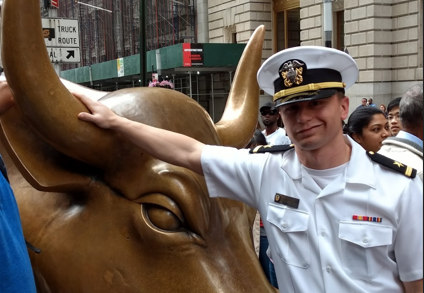Dominic Tria, born in 1993 in Roswell, Georgia, is a dynamic individual whose journey has seamlessly blended technology, military service, and a passion for environmental conservation.
Dominic’s fascination with technology began in college, where he honed his skills by building computers. This passion led him to the U.S. Navy, where he served as a Datacenter Operations Manager, overseeing critical technological infrastructures. Beyond his professional life, Dominic is an avid outdoor enthusiast and a dedicated volunteer, actively participating in environmental restoration projects and community service. His unique perspective combines cutting-edge tech knowledge with a commitment to serving both his country and the environment.
Q&A with Dominic Tria
How did your upbringing in Roswell, Georgia, influence your career path?
Growing up in Roswell, a place rich with community spirit and family values, laid the foundation for my life choices. The sense of responsibility and service was ingrained in me early on, which naturally led me to the military. Additionally, the supportive environment allowed me to explore my interests in technology. This combination of a strong community focus and a love for tech has been a constant guide in my professional journey.
What inspired you to join the U.S. Navy, and how did your role as a Datacenter Operations Manager shape your career?
The decision to join the Navy was driven by a desire to serve my country and be part of something larger than myself. As a Datacenter Operations Manager, I was at the forefront of integrating advanced technologies into military operations. This role was pivotal in shaping my career, as it provided me with hands-on experience in managing critical tech infrastructures and understanding the strategic importance of technology in national defense.
How has your passion for technology evolved since your college days of building computers?
My passion for technology has grown exponentially since those early days. Initially, it was about understanding how things work and the satisfaction of building something from scratch. In the Navy, I saw the broader implications of technology, from enhancing operational efficiency to safeguarding national security. Today, I continue to explore new tech innovations and their applications, whether it’s through smart gear for outdoor activities or advanced cybersecurity measures.
Can you share a memorable experience from your volunteer work in environmental conservation?
One of the most memorable experiences was volunteering in Hawaii for coastal habitat restoration. The hands-on work of removing invasive species and planting native vegetation was incredibly fulfilling. It underscored the importance of preserving our natural habitats and the impact of collective effort. This experience reinforced my belief in the power of community service and the need to protect our environment for future generations.
How do you balance your high-tech career with your love for outdoor activities and community service?
Balancing these aspects of my life requires intentional planning and prioritizing what’s important to me. I see technology not just as a career but as a tool that enhances my outdoor experiences and community service efforts. For instance, using GPS and mapping apps makes my hiking trips safer and more enjoyable, while smart gear can improve efficiency in volunteer projects. It’s all about integrating these passions seamlessly and ensuring that I stay connected to what matters most.
What are your thoughts on the future of military technology, and how do you see your role in it?
The future of military technology is incredibly exciting, with advancements in AI, robotics, and cybersecurity leading the way. These innovations will redefine how we approach defense and security. My role, I believe, is to stay at the cutting edge of these developments, leveraging my experience to contribute to more efficient and secure military operations. It’s about continuously learning and adapting to ensure that technology serves its highest purpose.
How has your military service influenced your approach to technology and environmental conservation?
Military service has instilled in me a disciplined and strategic approach to both technology and environmental conservation. The emphasis on precision and efficiency in the military translates well into tech management and conservation efforts. It has taught me the importance of leveraging technology responsibly and ethically, whether it’s ensuring the integrity of data systems or using tech to enhance environmental restoration projects.
What advice would you give to someone looking to combine a career in technology with a commitment to community service?
My advice would be to stay curious and open to learning, as technology is a rapidly evolving field. Look for ways to integrate your tech skills with community service projects, whether it’s through volunteering for tech-based initiatives or using your expertise to support non-profits. The key is to find a balance that allows you to pursue your passions while making a positive impact on society. Remember, technology can be a powerful tool for change when used with intention and purpose.
Thank you for joining me in this exploration of how technology, military service, and environmental advocacy can intersect and complement each other. If you have any more questions or want to connect, feel free to reach out!


